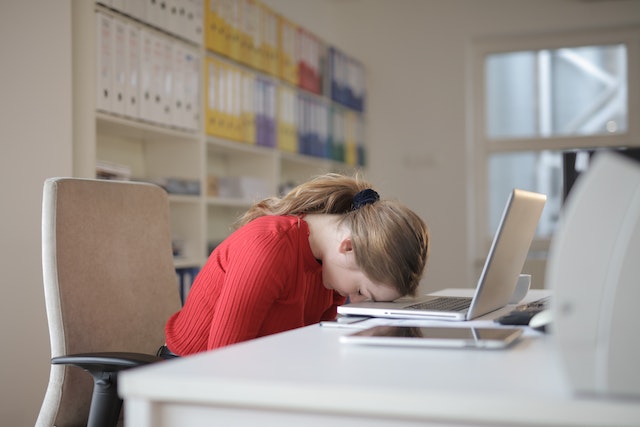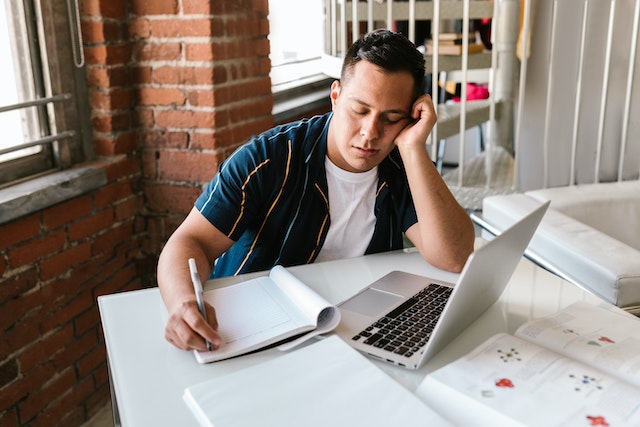What are the Causes of Insomnia?
Insomnia is a sleep disorder that affects as many as 35% of adults. It is marked by problems getting to sleep, staying asleep through the night, and sleeping as long as you would like into the morning. It can have serious effects, leading to excessive daytime sleepiness, a higher risk of auto accidents, and widespread health effects from sleep deprivation.
Common causes of insomnia include stress, an irregular sleep schedule, poor sleeping habits, mental health disorders like anxiety and depression, physical illnesses and pain, medications, neurological problems, and specific sleep disorders. For many people, a combination of these factors can initiate and exacerbate insomnia.

Woman Sleeping At Work
Is All Insomnia the Same?
Not all insomnia is the same; people can experience the condition in distinct ways. Short-term insomnia happens only over a brief period while chronic insomnia lasts for three months or more. For some people, the primary problem is falling asleep (sleep onset) while others struggle with staying asleep (sleep maintenance).
How a person is affected by insomnia can vary significantly based on its cause, severity, and how it is influenced by underlying health conditions.
Anxiety Treatment Chapel Hill N.C. CBT helps individuals address and treat anxiety, depression, relationship problems, etc. by teaching new skills and ways of coping. For example, someone with social anxiety may work to improve the skill of tolerating being in anxiety-inducing social situations. For people with insomnia, I also specialize in Sleep Therapy Chapel Hill, NC. Click to find out more information about sleep therapy and insomnia contact Dr. Sara Michelson for an initial consultation.
What Are Common Causes of Insomnia?
There are numerous potential causes of insomnia, and in many cases, multiple factors can be involved. Poor sleep can also trigger or worsen other health conditions, creating a complex chain of cause-and-effect for insomnia.
On a holistic level, insomnia is believed to be caused by a state of hyperarousal that disrupts falling asleep or staying asleep. Hyperarousal can be both mental and physical, and it can be triggered by a range of circumstances and health issues.
Insomnia and Stress
Stress can provoke a profound reaction in the body that poses a challenge to quality sleep. This stress response can come from work, school, and social relationships. Exposure to traumatic situations can create chronic stress, including post-traumatic stress disorder (PTSD).
The body’s physical response to stress contributes to hyperarousal, and mental stress can have the same effect. The inability to sleep may itself become a source of stress, making it increasingly harder to break the cycle of stress and insomnia.
Researchers believe that some individuals are more vulnerable to stress-induced sleeping problems. These people are considered to have high “sleep reactivity,” which is tied to other issues affecting their sleep and their physical and mental health.
Insomnia and Irregular Sleep Schedules
In an ideal world, the body’s internal clock, known as its circadian rhythm, closely follows the daily pattern of day and night. In reality, many people have sleep schedules that cause misalignment of their circadian rhythm.
Two well-known examples are jet lag and shift work. Jet lag disturbs sleep because a person’s body can’t adjust to a rapid change in time zone. Shift work requires a person to work through the night and sleep during the day. Both can give rise to a disrupted circadian rhythm and insomnia.
In some people, circadian rhythms can be shifted forward or backward without a clear cause, resulting in persistent difficulties in sleep timing and overall sleep quality.

Coffee can interfere with sleep
Insomnia and Lifestyle
Unhealthy habits and routines related to lifestyle and food and drink can increase a person’s risk of insomnia.
Various lifestyle choices can bring about sleeping problems:
- Keeping the brain stimulated until late in the evening, such as by working late, playing video games, or using other electronic devices.
- Napping late in the afternoon can throw off your sleep timing and make it hard to fall asleep at night.
- Sleeping in later to make up for lost sleep can confuse your body’s internal clock and make it difficult to establish a healthy sleep schedule.
- Using your bed for activities besides sleep can create mental associations between your bed and wakefulness.
Though often overlooked, choices about your diet can play a role in sleeping problems like insomnia.
Caffeine is a stimulant that can stay in your system for hours, making it harder to get to sleep and potentially contributing to insomnia when used in the afternoon and evening. Nicotine is another stimulant that can negatively affect sleep.
Alcohol, which is a sedative that can make you feel sleepy, can actually worsen your sleep by disturbing your sleep cycle and causing fragmented, non-restorative sleep.
Eating heavy meals and spicy foods can be hard on your digestive process and have the potential to generate sleeping problems when consumed later in the evening.
Insomnia and Mental Health Disorders
Mental health conditions like anxiety, depression, and bipolar disorder frequently give rise to serious sleeping problems. It is estimated that 40% of people with insomnia have a mental health disorder.
These conditions can incite pervasive negative thoughts and mental hyperarousal that disturbs sleep. In addition, studies indicate that insomnia can exacerbate mood and anxiety disorders, making symptoms worse and even increasing the risk of suicide in people with depression.
Insomnia, Physical Illness, and Pain
Almost any condition that causes pain can disrupt sleep by making it harder to lie comfortably in bed. Dwelling on pain when sleepless in bed may amplify it, increasing stress and sleeping problems. If you do suffer from pain while laying in bed, it’s important to pick the best mattress for your needs, as beds with good pressure relief can ease troublesome pain points.
Health complications related to Type II diabetes can be part of an underlying cause of insomnia. Pain from peripheral neuropathy, more frequent need for hydration and urination, and rapid blood sugar changes can interrupt sleep. There is also a correlation between diabetes and other health conditions that are known to interfere with sleep including obstructive sleep apnea (OSA) and depression.
Other types of physical illness, including those affecting the respiratory or nervous system, may pose challenges to sleep that can culminate in short-term or chronic insomnia.
Insomnia and Medications
Sleeping problems and insomnia can be side effects of many types of medications. Examples include blood pressure drugs, anti-asthma medications, and antidepressants. Other drugs may cause daytime drowsiness that can throw off a person’s sleep schedule.
It’s not just taking medications that can interrupt sleep. When someone stops taking a drug, withdrawal or other aspects of the body’s reaction can create difficulties for sleep.
Insomnia and Neurological Problems
Problems affecting the brain, including neurodegenerative and neurodevelopmental disorders, have been found to be associated with an elevated risk of insomnia.
Neurodegenerative disorders, such as dementia and Alzheimers dementia, can throw off a person’s circadian rhythm and perception of daily cues that drive the sleep-wake cycle. Nighttime confusion can further worsen sleep quality.
Neurodevelopmental disorders like attention-deficit/hyperactivity disorder (ADHD) can cause hyperarousal that makes it hard for people to get the sleep they need. Sleeping problems are common for children with Autism Spectrum Disorder (ASD) and may persist into adulthood.
Insomnia and Specific Sleep Disorders
Specific sleep disorders can be a cause of insomnia. Obstructive sleep apnea, which causes numerous breathing lapses and temporary sleep interruptions, affects up to 20% of people and can be an underlying factor causing insomnia and daytime sleepiness.
Restless Leg Syndrome (RLS) detracts from sleep by causing a powerful urge to move the legs. Abnormal behaviors during sleep, known as parasomnias, can interfere with sleep. Some well-known examples of parasomnias include sleepwalking, nightmares, and sleep paralysis.
What Are Causes of Insomnia in the Elderly?
Insomnia occurs in 30-48% of older adults, who often have particular struggles with sleep maintenance.
As in people of a younger age, stress, physical ailments, mental health problems, and poor sleep habits can cause insomnia in the elderly. However, elderly people are often more sensitive to these causes because of higher levels of chronic health conditions, social isolation, and an increased use of multiple prescription drugs that may affect sleep.
Research indicates that people over age 60 have less sleep efficiency. They spend less time in deep sleep and REM sleep, which makes it easier for their sleep to be disturbed. A decrease in daylight exposure and reduced environmental cues for sleep and wakefulness can affect circadian rhythm, especially for elderly people in managed care settings.
What Are the Causes of Insomnia in Teens?
Insomnia has been estimated to affect up to 23.8% of teens. Biological changes push teens toward a later, “night owl” sleep schedule, but they usually can’t sleep as long as they would like in the morning because of school start times.
Teens may be especially susceptible to over scheduling and stress from school, work, and social obligations. Teens also have high rates of using electronic devices in their bedroom. Each of these factors contributes to a high rate of insomnia during adolescence.
What Are the Causes of Insomnia During Pregnancy?
Multiple factors can cause insomnia during pregnancy:
- Discomfort: Increased weight and changed body composition can affect positioning and comfort in bed.
- Disrupted Breathing: Growth of the uterus places pressure on the lungs, creating potential for breathing problems during sleep. Hormonal changes can increase snoring and the risk of central sleep apnea, which involves brief lapses in breath.
- Reflux: Slower digestion can prompt disruptive gastroesophageal reflux in the evening.
- Nocturia: Greater urinary frequency can create the need to get out of bed to go to the bathroom.
- Restless Leg Syndrome: The exact cause is unknown, but pregnant women have a greater risk of RLS even if they have never had symptoms before becoming pregnant.
Studies have found that more than half of pregnant women report sleeping problems consistent with insomnia. In the first trimester, pregnant women frequently sleep more total hours, but the quality of their sleep decreases. After the first trimester, total sleep time decreases, with the most significant sleeping problems occurring during the third trimester.
Types of Sleep Therapy
The most commonly utilized and studied type of sleep therapy for insomnia is cognitive behavioral therapy for insomnia (CBTi). CBTi is the gold standard of evidence-based treatment for sleep problems
Techniques
A therapist who specializes in CBTi may use different techniques to help improve your sleep. Because sleep can be impacted by many mental health concerns, your therapist may conduct a detailed assessment to determine why your sleep is being affected and draw upon multiple techniques for treatment.
Sleep Hygiene
Improving your sleep hygiene involves building healthy sleep-related habits and routines. This means changing basic lifestyle tendencies that influence sleep, such as limiting alcohol, caffeine, and smoking, and increasing exercise. It also focuses on creating a consistent sleep-wake schedule.
Sleep Environment Optimization
Your therapist may recommend altering aspects of your sleep environment so that it is comfortable and conducive to unbroken sleep. For instance, keeping your room quiet, dark, and cool, and hiding any clocks may help.

Too much screen time can interfere with sleep
Stimulus Control
Stimulus control involves removing cues that condition your mind to resist sleep.
For example, you may often lie in your bed and watch entertaining shows, which can cause you to associate your bed with excitement. Stimulus control encourages you to commit to a consistent bedtime and use the bed only for sleep. Your therapist may instruct you to leave the bedroom if you are unable to sleep within 20 minutes, and return only when you feel drowsy.
Paradoxical Intention
CBTi utilizes a technique called paradoxical intention, which requires you to commit to staying awake. This works because you’re not worrying about not being able to sleep. Letting go of your resistance and anxiety can often make it easier to sleep.
By Eric Suni & Medically Reviewed by
Alex Dimitriu, Psychiatrist
Photo:Unsplash